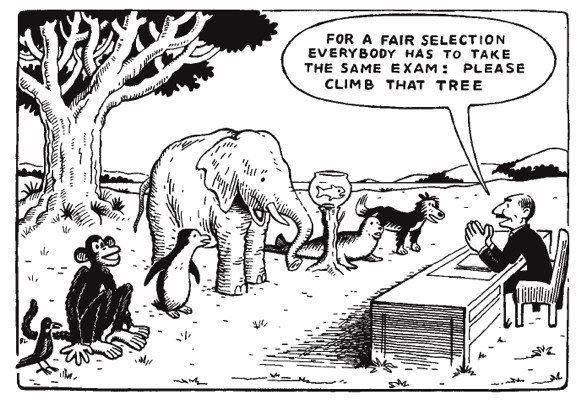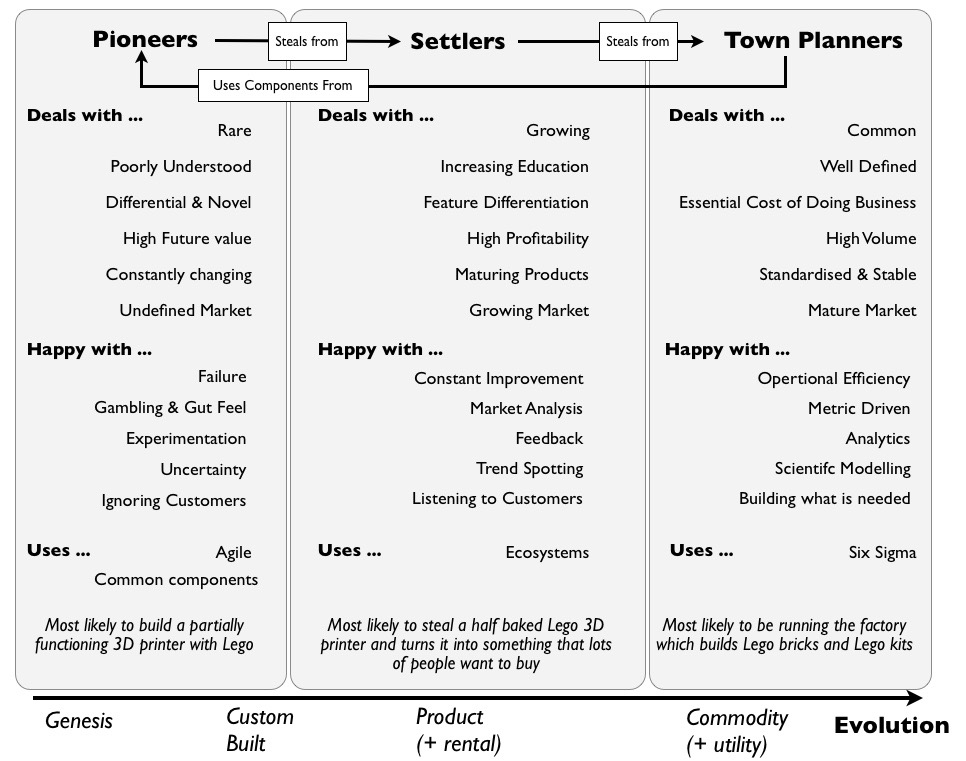Everyone is a genius. But if you judge a fish by its ability to climb a tree, it will live its whole life believing that it is stupid. That’s a popular saying that is often attributed to Albert Einstein. Although there is no evidence for this, it fits very well with Einstein’s biography: He only began to speak at the age of three and although he was not bad at school, he was no child prodigy. His strengths remained undiscovered for a long time, or at least were not used sufficiently. At the time of his groundbreaking first publications in his annus mirabilis 1905, he was a 3rd class technical expert at the Swiss Patent Office. And that was actually already a step up, because he previously had to work as a private tutor after his applications for assistant positions at the Swiss Polytechnic and other universities were rejected.

In his book “The Effective Executive” (Amazon Affiliate Link), which is very worth reading again and again, Peter F. Drucker dedicates a whole chapter to the question of how to employ yourself and your employees in the best possible way. His basic assumption is that everyone has some individual strengths — and quite a number of weaknesses. This is probably in line with the experience we make every day as human beings, bosses, employees or parents.
The idea that there are “well-rounded” people, people who have only strengths and no weaknesses (…) is a prescription for mediocrity if not for incompetence. Strong people always have strong weaknesses too.
Peter F. Drucker, 1967. The Effective Executive
But since our school days we have been focused on the deficits. In job interviews we are then asked about our greatest weakness and in each annual appraisal interview we are asked where we still need to improve. All with the aim of making us as well-rounded as possible. However, this almost inevitably causes strengths to wither away, while weaknesses are developed to an acceptable mediocrity. This is neither good for the people and their motivation, which is essentially based on their self-realization, nor is it good for the performance of the organization.
To make strength productive is the unique purpose of organization. It cannot, of course, overcome the weaknesses with which each of us is abundantly endowed. But it can make them irrelevant.
Peter F. Drucker, 1967. The Effective Executive
Leadership means to making strengths productive and weaknesses irrelevant. And leadership always begins with self-leadership and thus with knowing and accepting oneself in one’s unique nature, with the respective strengths and weaknesses. It is about remaining true to oneself without constantly imitating other people or pursuing an abstract and entirely perfect ideal image.
We are all born originals – why is it so many of us die copies?
Edward Young
The recognition of one’s own strengths is not something that is laid in one’s cradle or falls into one’s lap, but is the result of systematic reflection. Effective managers set themselves goals and regularly review their performance. Peter F. Drucker recommends the so-called Feedback Analysis: For every important decision, expectations and fears are written down and compared with the actual results after 9 to 12 months (see Peter F. Drucker, Managing Oneself. Amazon Affiliate Link). A simple but effective method to systematically identify your own strengths.
Most people think they know what they’re good at. They are usually wrong. More often, people know what they’re not good at — and even then more people are wrong than right.
Peter F. Drucker
A good way to explore one’s own strengths can be personality tests (despite all justified criticism) like this very nice one from 16Personalities. I at least recognized myself well in my result Logician / INTP‑T (even apart from the Barnum effect). I have understood that I am always attracted by the new. At least until I have basically understood it and tried it out to some degree. Afterwards, when it comes to implementing, rolling out and industrializing it, my motivation decreases noticeably.
That’s why I’ve been writing short blog articles for almost 10 years and hardly any books and if books like the Manifesto for Human(e) Leadership, then books that consist of blog articles. That’s why my journey through life is not a straightforward career path. And that is why I find the concept of Wu Wei much more appealing than the exercise of setting life goals by writing my own eulogy and working towards them.

In the terminology of Simon Wardley, I’m probably more of a pioneer than a settler or town planner. And that’s a good thing. At least as long as you are able to use these strengths and there are others that make up for my weaknesses as a settler or town planner. But that’s exactly what organizations (or networks) exist for. And sometimes you are lucky and get a true leader as boss, who wants to make strengths productive and unleash the human potential.





